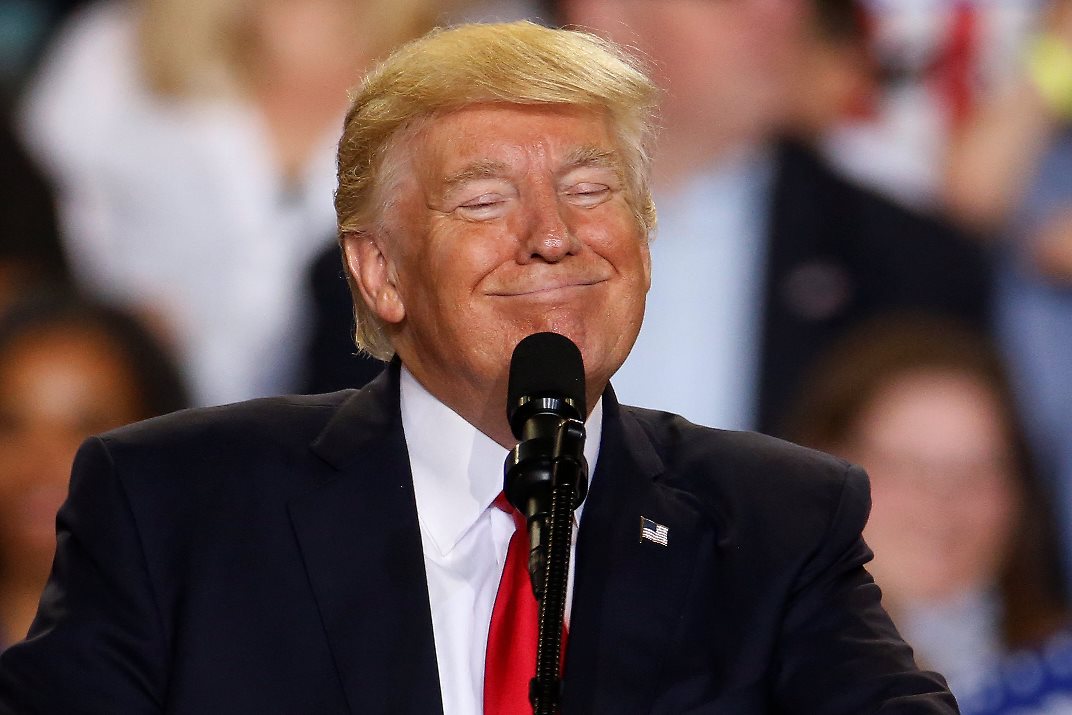Politics & Security
After Trump’s First 100 Days, Republicans Better Show ‘Policy Improvements’
Published
7 years agoon

U.S. President Donald Trump appears on stage at a rally in Harrisburg, Pennsylvania, U.S. April 29, 2017. REUTERS
Dan Schneider, executive director of the the American Conservative Union, answers the question, “How is United States President Donald Trump doing?” past the mark that media and the public consider as their honeymoon period with any new administration. How conservative are the new administration’s views and policies are, and how will these affect its relations with allies, including Japan? Yoshinari Kurose, the Sankei Shimbun Washington DC bureau chief asks some hard questions in this April 24 interview.

So first, before going down to specific policies, can you give me like a kind of overall impression of how President Trump is doing?
Conservatives never forget that the choice was between Donald Trump and Hillary Clinton. So, the first 100 days of the Donald Trump administration are entirely different than we would have seen had Hillary Clinton been elected president. So, dramatic differences between the two administrations. In the first 100 days of the Donald Trump administration, of course, we have seen a new Supreme Court justice sworn in, a great justice that conservatives are very confident in. We have seen a number of the Barack Obama regulations repealed by Congress with the signature of the President of the United States, so we are very happy to see those things as well. I am also very pleased to see who the President has picked to be part of his administration, the Cabinet on down, and those people are entirely different than the people Hillary Clinton would have picked.
So far, if we define “conservatism” as conservative values, small government, free economy, and strong national security, if you see his policies, do they reflect these three values?
They mostly do, yes. We believe that conservatism respects the rights of the individual, that the individual deserves to be respected. Liberals don’t see that. Liberals place greater value on the role of the state over the individual, so we see policies that reflect these two different political philosophies. So, in the Trump administration, we are seeing policies that are more consistent with conservatism. We see him trying to work for a balanced budget. We see him improving our national security. We see him honoring his word that if, for example, the Syrian president uses chemical weapons, that there will be action taken.
About his word, the most famous phrase is “America First” and, of course, I believe that it is obvious that many Trump supporters love that word—“America First.” But it is actually a bit concerning for the trade partners like Japan, since this may lead to economic isolationist policy. How should this conservative value in economics fit into the Trump administration’s economic and trade policies?
As a conservative, I believe in free trade. So, I, too, am watching carefully, as the Japanese people are, whether this president will negotiate good free trade deals or whether he will pull back and become an isolationist. I think he is going to be for free trade, but we don’t know yet. We know that he wants a better trade deal, but I think everyone is waiting to see what he means by that. I hope he wants free trade.
Do you think actually pulling out from TPP is a good idea for the United States?
Well, there were many problems with the Trans-Pacific Partnership agreement. Any time you see a big, multinational trade agreement, it is guaranteed it is going to have lots of flaws. So, it is my hope that the President and our trade representative will be able to negotiate a better deal directly with Japan and negotiate a better deal with the South Koreans and with other Pacific Rim countries. In the end, I think each of these trade agreements can be much better for everybody. I hope. I mean, I will be very disappointed if we end up with no trade deal or a worse trade deal.
So we have to wait and see.
We have to wait and see, and we think that the two countries should be trading more freely, not less freely.
And you mentioned Syria, the Syrian chemical attacks. President Trump responded decisively and promptly. And response to North Korea. Looking at these two events, it seems like Mr. Trump and the Trump administration’s foreign policy is turning to traditional Republican so-called “engagement” approach. So how do you evaluate this?
Well, the Republican Party has had very different perspectives on national security over the decades. I think Ronald Reagan developed a good strategy which, in the United States, we refer to as “Peace Through Strength.” You want a strong military so that the world is peaceful. President Bush went in a more aggressive posture and it wasn’t merely having strength, it was having strength and then using it aggressively. So, I think Donald Trump has pulled back from the George W. Bush approach to national security, and has adopted that Reagan model of having a strong military so that you rarely have to use it. So, I think that his response to Syria, it was decisive, but it was also very measured. It was similar to President Reagan’s response to Muammar Khadafy. It was measured, it was precise, and then there was a moment—in this case, Syria—to weigh whether it will continue its bad behavior. So, I think that is how we maintain peace without getting involved in protracted wars.
If Mr. Trump is following the Reagan doctrine, who do you think is actually educating or telling him this kind of foreign policy approach?
I think President Trump did not need anybody to educate him on this. He was a young businessman during the Carter years and he saw what weakness did. When a nation is weak, it provokes bad behavior abroad. As a businessman during the Reagan administration, Mr. Trump saw that when the US had military strength, bad actors did not engage in bad behavior. However, during the last eight years of the President Obama administration, the US’ weakness and the US’ reticence to engage our military resulted in lots of bad behavior, including the formation of ISIS, including the Syrian president using chemical weapons. It is a tricky balance, but I think this is one place where Mr. Trump needs no advice. He seems to have gotten it right.

How about North Korea? Part of the Reagan doctrine is that the conditions for the military strike are: 1) the enemy would not retaliate against the United States; and 2) there would be no or very few casualties on the US side. But if we attack North Korea, the consequences would be worse than like when Mr. Reagan attacked Libya or Mr. Trump attacked the Syrian regime this time.
Well, the worst thing a president can do is respond in kind with the same degree of force that was imposed on us. All that does is provoke additional attacks. The right response is a much greater action taken against the enemy. North Korea is run by a madman, so I think we are all hoping that this can get resolved diplomatically, but we have to be prepared for the worst with this man. The people of Japan, the people of Hawaii, are in direct line of attack and we have got to make sure that the North Korean people understand that if they act against one of our closest allies in the world—Japan—that the United States will not sit idly by, that we will defend our neighbor and our friend and prevent any further action from being taken.
So, turning the topic to this year's Conservative Political Action Conference (CPAC), actually you kicked out Mr. Richard Spencer, Mr. Milo Yiannopoulos, the so-called “alt-right” people at the conference, which had considerable coverage and considerable praise. Can you explain the importance of your decision?
Yes. I will limit my comments to Richard Spencer. Milo is a different thing. Richard Spencer calls himself a “white nationalist.” He believes that white people, Caucasian people, are superior to everybody else, and he wants the United States to be exclusively a white nation. I find that abhorrent. There is nothing conservative about his views. He does not believe in our Constitution. He does not believe in federalism. He does not believe in democracy. And he was not welcome at CPAC and his views are not reflective of conservatism and he was not welcome.
And during the campaign and even after the campaign, Democrats and liberals actually attacked Mr. Trump or Republicans that this is a racist administration, or they are run by racist people and their policies are based on a racist agenda. How would you comment on those accusations?
There are some people in the Trump administration who call themselves “economic nationalists.” They want to focus on the US economy, they want our automakers in Detroit to have good jobs, and they want our coal miners in West Virginia to have good jobs. Regardless of their skin color, the black autoworker in Detroit or the Latino coal miner in West Virginia, these economic nationalists who work for President Trump want everybody to have good jobs in America. It is not about race, it is about the US economy. Richard Spencer and the white nationalists care about race, not about the creation of jobs for every American. They are two entirely different things, but many in the mainstream media in America confuse economic nationalism with white nationalism.
And even though you kicked out Richard Spencer, there are many alt-right people all over the country and some are very influential, like Mr. Alex Jones, who has millions of viewers and it seems like many of those viewers are Trump supporters. How do you see those people and those people are still the base of Mr. Trump or a liability for the Trump administration?
Well, the term, “alt-right” is used in different ways. Some people use the term, “alt-right” to mean economic nationalism. Some people use the term, like Richard Spencer does, to mean white nationalism. I don’t know the views of these other people that you have mentioned—I do know the views of Richard Spencer. He has been very clear about those views. But the term “alt-right” was first used by a man who was simply wanting to return to the Reagan doctrine on foreign policy. He himself is a Jewish man; he obviously is not anti-Semitic. But the term has been used in different ways over time.
What is that guy's name?
I forget his name. He coined the phrase at the beginning of the George W. Bush administration. He did not like President Bush’s more aggressive foreign posture. He wanted to pull back to the Reagan doctrine. He was the first person then to use the term “Alternative Right,” meaning an alternative point of view to George W. Bush, more consistent with the Reagan doctrine. So, the term “alt-right” is defined differently by different groups. But, clearly, when the white nationalists use the term “alt-right,” we are opposed to that.

Okay, so you separated those people. On the other hand, all of these conservative movements has to be a broad coalition which means that there will be—there is not a single economic policy, a single—well, certainly, you consider that a positive thing.
Yes, the broader coalition of conservatives will not always agree on policy issues. In fact, there will almost always be disagreement on policy issues. Valid points of view, but different. But when it comes to things like racism, there is no valid point of view on race that is anti-someone based on their skin color. That is never acceptable.
And still it is only 100 days after the inauguration, but next year, there will be as midterm election. What is the prospect of the Republicans and conservatives?
In America, with elections every two years for the House of Representatives, elections are always around the corner it seems. But it is not until about six months before an election that you are really able to start to see a possible future outcome. So, I think the next 12 months will be very important for Republicans. They had better demonstrate some real policy improvements. If they don’t they are going to be in trouble. But the idea that they have to have improvements within the first 100 days is kind of silly. What really matters is what happens over the next 12 months.




You must be logged in to post a comment Login